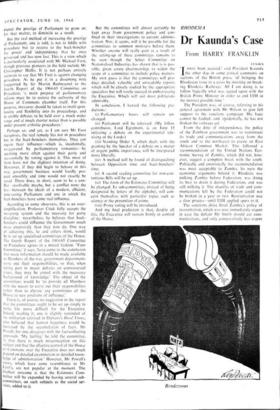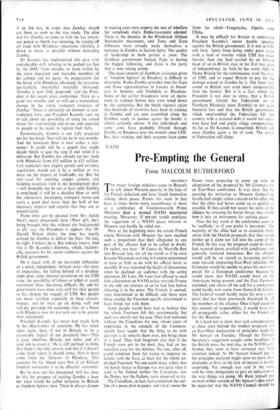RHODESIA
Dr Kaunda's Case
From HARRY FRANKLIN
LUSAKA
4-1- HAVE been accused,' said President Kaunda
the other day in some critical comments on sections of the British press, 'of bringing the Rhodesian issue to a crisis by insisting on break- ing Rhodesia Railways. All I am doing is to follow logically what was agreed upon with the British Prime Minister in order to end UDI in the shortest possible time.'
The President was, of course, referring to his general agreement with Mr Wilson to give full support to the sanctions campaign. His logic cannot be faulted; and, incidentally, he has not broken the railways yet.
From the date of independence, the policy of the Zambian government was to reorientate its trade and communications away from the south and to the north-east to create an East African Common Market. This followed a recommendation of the United Nations Eco- nomic Survey of Zambia, which did not, how- ever, suggest a complete break with the south. Politically and emotionally the recommendation was most acceptable to Zambia. So were the economic arguments behind it. Rhodesia was milking Zambia before Federation, was doing its best to drain it during Federation, and was still milking it. The shackles of trade and com- munications left by the Federation could not be broken in a year or two. Reorientation was a slow process—until UDI applied spurs to it.
The sanctions drive fitted Zambia's policy of reorientation, which was now immediately urgent in case the defiant Mr Smith should cut com- munications, and only comparatively less urgent
Rendezvous
if he did not, in order that Zambia should cut them as soon as she was ready. The plan was for Zambia to come in with the last knock- out punch as Smith was tottering, by cutting off all trade with Rhodesia—meantime whittling it down as much as possible without damaging Zambia.
Dr Kaunda has implemented this plan with considerable skill, refusing to be pushed too fast by the OAU from outside, or from within by the more impatient and excitable members of his cabinet and his party. As preparations for the break with Rhodesia advanced, the pressures (particularly internally) naturally increased. 'Zambia is now fully prepared,' said the Presi- dent at his recent press conference. 'Give us a good two months and we will see a tremendous change in the whole transport structure of Zambia.' There is obviously an element of con- tradiction here, and President Kaunda went on to talk about the possibility of using the armed forces for road-making and so on, and appealed to people to be ready to tighten their belts.
Economically, Zambia is not fully prepared yet for the break. Nor will she be in two months. And the knockout blow is now rather a mis- nomer. It could still be a punch that might decide Smith to quit the ring if and when'it is delivered. But Zambia has already cut her trade with Rhodesia from £35 million to £15 million. Last weekend's new import permit and currency regulations should cut it by a million or two more on the import of foodstuffs, etc. But the rest—coal for smelting, copper, cement, and building materials vital to the development plan —will probably not be cut at least until Zambia is convinced it will be a decisive blow or until her alternative, developing transport routes can carry a good deal more than the half of her necessary imports and exports that they can at present carry.
From what can be gleaned from Mrs Judith Hart's secret discussions here (Poor girl, she's being brought into this without any background at all,' says the President) it appears that Mr Harold Wilson thinks the time has nearly arrived for Zambia to deliver the blow. He may be right. I believe he-is. But nobody knows. And this is Dr Kaunda's dilemma, which, incident- ally, accounts for his recent outbursts against the British government.
He is faced with all the inevitable difficulties of a newly independent African state—the crisis of expectancy, the falling behind of a develop- ment plan, some internal extremism on the UDI issue, the possibility of labour or tribal or youth movement blocs becoming difficult. He and his government have done very well for their people so far, despite the tragedy of UDI. But people are never satisfied, especially in these circum- stances, and he must go on doing well and will do, provided the economic risks of a break with Rhodesia now do not turn out to be greater than anticipated.
President Kaunda has never had much faith in the effectiveness of sanctions. He has taken what seems here, if not in Britain, to be a reasonably logical (if not practical) line—This is your rebellion, Britain, not mine, and it's your job to crush it.' He is still inclined to think that force is the only answer, and that if it doesn't come from where it should come, then it must come from the Africans of Rhodesia. This accounts for his 'blood must flow if an African freedom movement is to be effective' statement.
But he does not like bloodshed. Still less does he like the prospect of making Zambia a base for what would be called terrorists in Britain or freedom fighters here. There is always danger in making your own country the seat of rebellion for somebody else's. Embarrassments abound. There is the disunity in the Rhodesian African Nationalist movement, and Zapu and Zanu followers have already made themselves a nuisance in Zambia in faction fights. The quality of leadership in both parties is poor. The Zambian government backed Zapu as having the biggest following, and Zanu is the party that is now taking action.
The exact amount of Zambian assistance given to 'freedom fighters' in Rhodesia is difficult to determine. Radio Zambia provides time for Zapu and Zanu representatives in Lusaka to broad- cast in Seshona and Sindebele to Rhodesia. Some of the earlier broadcasts were an incite- ment to violence before they were toned down by the authorities. But the Smith regime's claim that hundreds of terrorists have been in training in Zambia and are now assembled along the Zambesi ready to pounce across the border is almost certainly untrue. A few individuals and some arms have probably filtered through Zambia to Rhodesia over the months since UDI. But their training and their weapons have come from far afield—Tanganyika, Algeria, even China.
It may be difficult for Britain to understand President Kaunda's recent hostile speeches against the British government. It is not so diffi- cult here. Apart from being under great strain with a load of worries which UDI has made heavier than any load carried by an African head of an ex-British state in the first two years of independence, he feels he has every right to blame Britain for the continuance, even the start, of UDI, and to expect Britain to pay for the damage caused to Zambia by it. The latter may sound to British ears even more unreasonable than the former. But it is a fact, which the President is not slow to stress, that a British government foisted the Federation on to Northern Rhodesia (now Zambia) to her great financial loss and that the British government which unscrambled the Federation left this country with a national debt it would not other- wise have had and pretty stingy compensation. As far as Dr Kaunda is concerned, Britain still owes Zambia quite a lot of cash. The odour of Federation still clings.



































 Previous page
Previous page